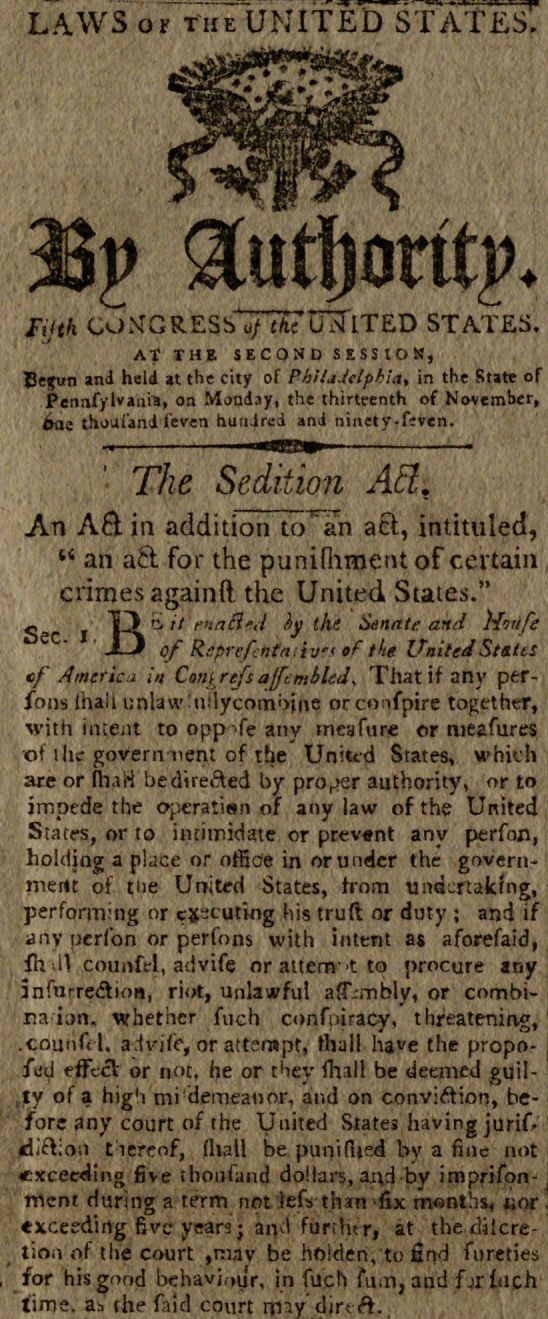The Sedition Act, 1798
A Spotlight on a Primary Source by the US Congress
 On August 14, 1798, the Columbian Centinel, a Boston newspaper aligned with the Federalist Party, printed this copy of the Sedition Act. It was the last in a series of legislation known as the Alien and Sedition Acts passed by the United States Congress and signed into law by President John Adams in July. These acts were written to silence Democratic-Republicans’ criticism of Federalist policies during the Quasi-War with France.
On August 14, 1798, the Columbian Centinel, a Boston newspaper aligned with the Federalist Party, printed this copy of the Sedition Act. It was the last in a series of legislation known as the Alien and Sedition Acts passed by the United States Congress and signed into law by President John Adams in July. These acts were written to silence Democratic-Republicans’ criticism of Federalist policies during the Quasi-War with France.
The Sedition Act, which was the only one in the series that applied to citizens of the United States, made it illegal to “write, print, utter or publish . . . any false, scandalous, and malicious writing or writings against the government of the United States.” Although Democratic-Republicans complained that the law violated the First Amendment, the Federalist-controlled Congress passed the Sedition Act by a vote of 44 to 41.
Federalists believed that the Sedition Act was necessary for the security of the United States during the undeclared Quasi-War with France. They feared that criticism from Democratic-Republicans and in newspapers such as the Aurora would undermine the government. In the three years that the act was in effect, there were twenty-five arrests, fifteen indictments, and ten convictions.[1]
There are four sections to the Sedition Act. The first two define acts that would be considered seditious and the penalties for violating the law. The third section establishes the truth as a defense against accusations of libel. The final section provides that the act would expire on March 3, 1801—the day before the next presidential inauguration.
Excerpt
Sec. 1. Be it enacted by the Senate and House of Representatives of the United States of American in Congress assembled, That if any persons shall unlawfully combine or conspire together, with intent to oppose any measure or measures of the government of the United States, which are or shall be directed by proper authority, or to impede the operation of any law of the United States, or to intimidate or prevent any person holding a place or office in or under the government of the United States, from undertaking, performing or executing his trust or duty, and if any person or persons, with intent as aforesaid, shall counsel, advise or attempt to procure any insurrection, riot, unlawful assembly, or combination, whether such conspiracy, threatening, counsel, advice, or attempt shall have the proposed effect or not, he or they shall be deemed guilty of a high misdemeanor, and on conviction, before any court of the United States having jurisdiction thereof, shall be punished by a fine not exceeding five thousand dollars, and by imprisonment during a term not less than six months nor exceeding five years; and further, at the discretion of the court may be holden to find sureties for his good behaviour in such sum, and for such time, as the said court may direct.
A full transcript is available here.
[1] Peter Macnamara, “The Sedition Act of 1798,” The First Amendment Encyclopedia, originally published 2009. https://www.mtsu.edu/first-amendment/article/1238/sedition-act-of-1798.
